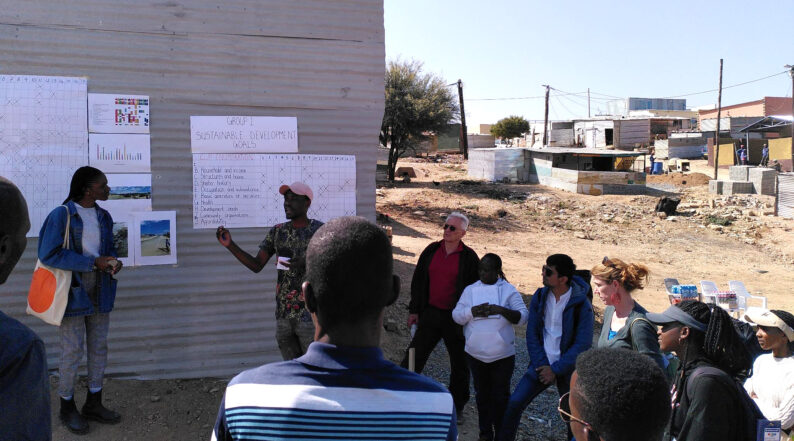From 25.7.-29.7.2022 an interdisciplinary Community Studio was conducted in Windhoek, Namibia focusing on the translation of the global Sustainable Development Goals (SDGs) to the local and institutional level, while including the perspective of people, neighbourhoods and districts. The latter is one of the critical challenges facing us today.
The Community Studio was part of the research project GoGlocal! (2021-2022), funded by the Ministry of Science, Research and the Arts (MWK) Baden-Wuerttemberg. Partners involved in the research project are the department of International Urbanism (SI) and the Institute of Energy Economics and Rational Energy Use (IER) of the University of Stuttgart, the Namibia Energy Institute (NEI) and the department of Architecture and Spatial Planning of the Namibian University of Science and Technology. In addition, there is a close cooperation with partners from civil society, such as the Namibian Housing Action Group (NHAG), as well as with the City of Stuttgart (Department for External Relations and Department of Urban Planning and Housing) and the City of Windhoek. Representatives of both cities were involved in the Community Studio along with citizens of the neighbourhood Kabila C in Windhoek and students from Stuttgart and Windhoek (study programm architecture and planning/ program renewable energy systems).
Main objectives and outcomes of the Community Studio in Windhoek:
- Global indicators need to be screened and adapted to local requirements and context, especially on the scale of informal settlements. This task was conducted over the course of the research project using the example of Kabila C, an informal settlement in Windhoek, and tested on site in the settlement during the Community Studio.
- In general, there is a scarcity of data on SDG-relevant information. Especially on the neighbourhood level, there is a lack of appropriate data collection and, in some cases, a reluctance to include data from bottom-up processes into municipal databases. Building on the established processes of the Community Land Information Program (CLIP)), the Community Studio gathered particular data on SDG 7, 11 and 13 (the latter are the SDG research foci of GoGlocal).
- Co-production of data – with a specific focus on qualitative data – is essential to generate reliable, purpose driven data which is aptly fitting the purpose to establish mutual trust and define priorities for development needs. The Community Studio managed to include the citizens of Kabila C into the data gathering process and enhanced the transparency and reliability of the data gathered through digitizing the survey tools and conducting a digital analysis of the data.
- Building capacities and an awareness about who contributes to the implementation of the SDGs at the local neighborhood level is essential to anchor the SDGs locally. Here, the community studio managed to make a contribution at the academic level as well as at the level of the involved partners from the municipality and civil society.



